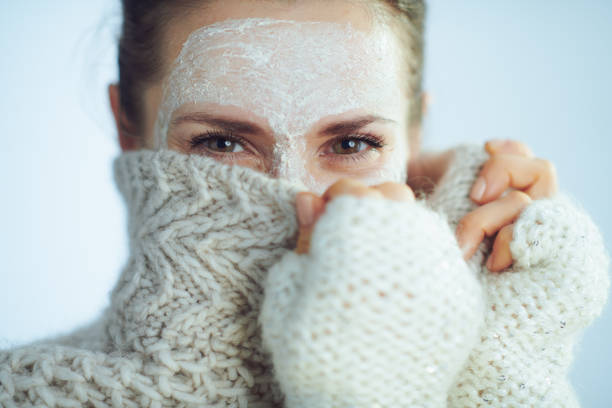Our skin is exposed to particular stresses in winter: dry heating air in the rooms, and cold winter air outside. In addition, it is supplied with less vitamin D due to a lack of sunlight and is usually cracked and dried quickly. Therefore, the right skincare in winter is important so that you can protect sensitive skin. Because with the right skin protection in winter, you can get through the cold season well.
Skin protection in winter is important
Winter means pure stress not only for sensitive skin. Because the cold lurks outside and the dry heating air inside. And both factors strain the skin and deprive it of moisture. As a result, the skin becomes dry, brittle, and cracked. While some home remedies help against dry skin, you should choose the right skincare in winter and ensure adequate skin protection.
1) The right skincare in winter

The main problem of sensitive skin in winter is dryness. Because the artificial heating air removes a lot of moisture from it, it flakes or dries out. This is where nourishing creams can help. However, it is important to use the right skincare. You protect your sensitive skin in winter with moisturizing and rich creams. Real chamomile, for example, has an anti-inflammatory and calming effect. Products with vegetable oils, such as nourishing argan oil or shea butter, also offer you suitable skin protection in winter.
2) Drink plenty of fluids
Protect sensitive skin from dryness in winter by drinking enough fluids. This way you supply them with liquid from the inside. Accordingly, drink at least 2-3 liters of water or tea per day. But you should avoid alcohol in winter because it also removes water from the body and contributes to the drying out of the skin. Likewise, avoid extensive bubble baths if you have sensitive skin. Instead, treat yourself to oil or cream baths.
3) Nutritious diet as skincare in winter
For suitable skin protection in winter, you should provide your skin with nutrient-rich nutrition. Therefore, eat salmon, nuts, or grapes for omega-3 fatty acids and other nutrients. Flaxseed oil or walnut oil when cooking can also support this effect. And if you want to provide your skin with lots of vitamins, you should grab pomegranates in the supermarket. In winter they are increasingly available and can be wonderfully integrated into muesli, desserts, or fruit salads. In contrast, you should reduce salty food a little during the cold season, as it draws water out of the body.
4) Proper showering and bathing
Another simple winter skin care tip is showering and bathing properly. Accordingly, you should not shower and bathe too often, as this dries out your skin. Also note that the water is not too hot, it is better to shower a little colder to protect your skin. In addition, you should use pH-neutral, moisturizing, and moisturizing products.
5) Full bath with salt as skin protection
To keep your skin firm and elastic in winter, you can take a full bath with salt. To do this, dissolve half a packet of iodized salt in the bathtub. This has an invigorating effect. Because it stimulates blood circulation and thus keeps the connective tissue of the subcutaneous tissue taut. Then your skin will renew itself faster. But after this bathing experience, you should rinse yourself off with plenty of clear water and apply lotion carefully. It can still be a fatty cream.
6) Proper skincare in winter with gentle soap

Sensitive skin is additionally stressed by soaps with a high proportion of cosmetics. Therefore use natural soaps or pH-neutral soaps in winter. Many health food stores offer a great selection of soaps based on natural ingredients. You can also find natural cosmetics products on the internet. You should only wash your hands when it is really necessary. Because too much contact of the hands with water, soap, and the washing-up liquid dries out the skin. Consequently, you should always have a good hand cream with you to care for your hands.
7) Create a room climate that is healthy for the skin
You don’t always have to reduce the humidity. In winter with dry heating air, you should ensure a skin-healthy room climate. Indoor plants work wonders. Varieties such as spider plants, Cyprus grass, and lime trees are particularly suitable, as they release around 98 percent of the water they absorb back into the environment.
